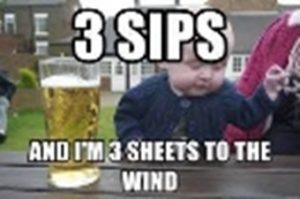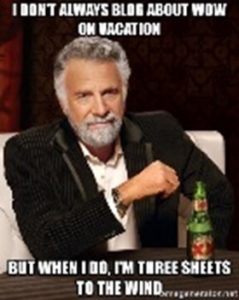Are you at a bar and someone tells you that you look "three sheets to the wind?" What do they mean? Do they think you're a sailor or something? This post unpacks everything you need to know about this idiomatic expression.
Meaning
If you're "three sheets to the wind," it means that you're feeling drunk or intoxicated, and you're having a great time. You probably hear people say this from time to time when they are starting to feel "loose" after drinking a few alcoholic beverages.
You'll use "three sheets to the wind" when talking about your behavior or that of other people around you.
Example Usage
"Look at Kim over there; she's dancing on the tables like she's three sheets to the wind. Maybe it's time to cut her off from the bar."
"John, I'm three sheets to the wind right now and feeling great; give me another drink."
"Sally arrived home three sheets to the wind last night. I found her devouring the leftover pizza at 3 Am after she woke me up."
"It's only 10 pm, and I'm three sheets to the wind already; I better slow down, or I'll be plastered by 12."


Origin
The phrase "three sheets to the wind" is a nautical term originating from the 19th century. On large ships, the ropes hold the sail corners taut, so they catch the wind, propelling the vessel forward.
These ships would typically have three sails. If the first sail lost is tautness, the boat would lose stability. If it lost two sails, it would yaw and pitch from side to side, and with three sails to the wind, the ship would lose all control.
"Three sheets in the wind" changed to "three sheets to the wind," but language experts are unsure of when the change occurred. When sailors arrived at their port of destination, they would go out into the city to drink and make merry.
As a result, the saying "three sheets to the wind" evolved to mean a sailor stumbling around drunk after consuming too much alcohol. The earliest written reference of the term comes from the Oxford English Dictionary in 1821. However, the phrase appeared in literature for the first time in Dicken's novel "Dombey and Son," published in 1848.
The book describes the protagonist, Captain Cuttle, thinking that his crew member, Bunsby, "was three sheets in the wind, or, in plain words, drunk."
Phrases Similar to Three Sheets to the Wind
- Feeling tipsy.
- Ready to rock.
Phrases Opposite to Three Sheets to the Wind
- Feeling sober.
- Clear-headed.
- Relaxed and idle.
What is the Correct Saying?
- Three sheets to the wind.
Ways People May Say Three Sheets to the Wind Incorrectly
Some people may use the phrase incorrectly as a sailing term. While this is the original format of the word, you'll only use it when you're on a sailboat, not when you're on a powerboat. Most people use the phrase to refer to how they feel as alcohol impairs their perception.
Acceptable Ways to Phrase Three Sheets to the Wind
You can use the phrase "three sheets to the wind" when you're feeling tipsy and feel alcohol starting to alter your perception. If someone were to ask you how you were feeling at the time, you could say you are "three sheets to the wind."
The phrase also suits use in explaining that you are engrossed in a task. For example, your boss could ask you for a progress update on your task, and you could say that you're "three sheets to the wind."